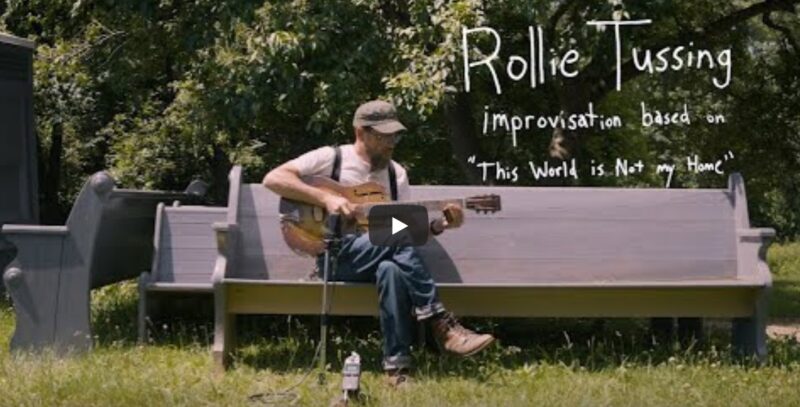One of the biggest regrets you hear from itinerant musicians is that life on the road prevented them from being there when their kids grew up. Anyone into music knows that sometimes we have local stars in our midst who are as good as any of the famous internationally traveling musicians. It’s just that they don’t tour on the road and chose to stay put locally and take care of their families.
Serious music fans know that local stars playing in small venues offer affordable, intimate gigs that are as good or better than many expensive, big concert venues. One notable example was the brilliant tenor saxophonist Buck Hill, in Washington, DC., who had a career as a mailman by day, but on the side, he was a world-class tenor sax player who recorded with Charlie Byrd, Kenny Barron, Buster Williams, and many other top tier players. He regularly appeared in Blues Alley in DC but rarely ventured outside of the city. When you heard him play, you knew that you were in the presence of musical greatness. On Washington’s WPFW Pacifica Radio jazz station he was deservedly heralded as one of the all-time greats, lauded as an equal to the best of the best, a guy en par with Johnnie Griffin, Dexter Gordon and Sonny Rollins.
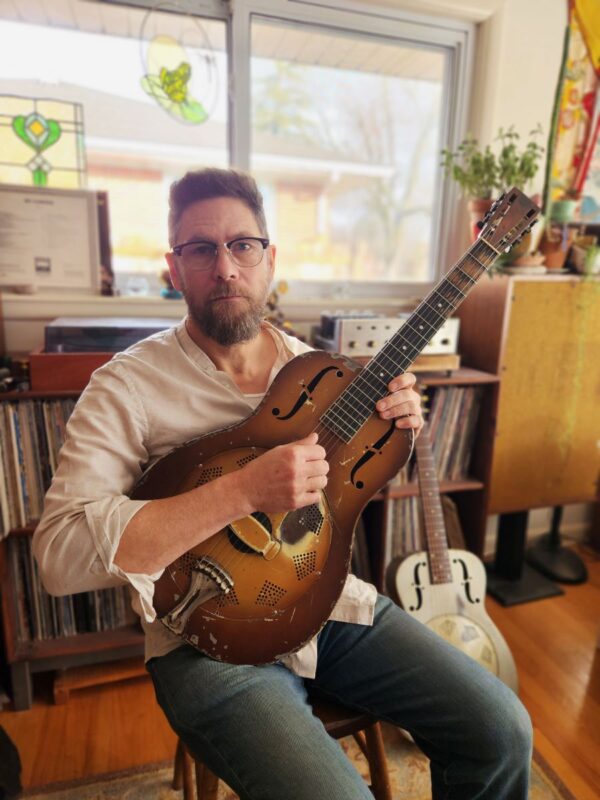
There is a guy up in Ann Arbor, Michigan, who fits the same description in the acoustic roots & blues realm. Rollie Tussing is an outstanding singer and fingerpicking/slide guitarist worth knowing, a player as good as the best in the roots & blues genre. If there was a fair correlation in the music business of actual musical skill and virtuosity to career success, he would be an international star driving a Bentley. He is a fine musician deserving broader recognition, but he is relatively unknown, even though he worked hard at his musical career for decades now. It shows in the playing, but not in the paying. The arts are a mean and cruel world. He is a great artist, indeed, but you won’t hear him in Amsterdam or Sydney. Born and raised in Ann Arbor, he spent a decade or so trying to build a music career playing in Portland, Oregon. Now, at age 54 he carries on, albeit with a noble day job to support his family. He stayed true to his calling, committed to an amalgam of old time, roots & blues and jazz.
The cold country of Ann Arbor, Michigan, doesn’t strike one as a place of importance for blues history, but it is, in no small part due to the famed Ann Arbor Blues and Jazz Festival, which was the first North American blues festival series, starting in 1969. So, he is playing on fertile ground, and he has built a strong second career. Wherever he goes, people swoon because this hotshot ol’ boy can play, be it swift alternating bass fingerpicking, Delta style slide or sophisticated blues, ragtime, jazz and swing phrasing. Mark Knopfler’s line from the song Sultans of Swing fits, “Check out guitar (Rollie), he knows-all the chords.” Tussing swings like mad.
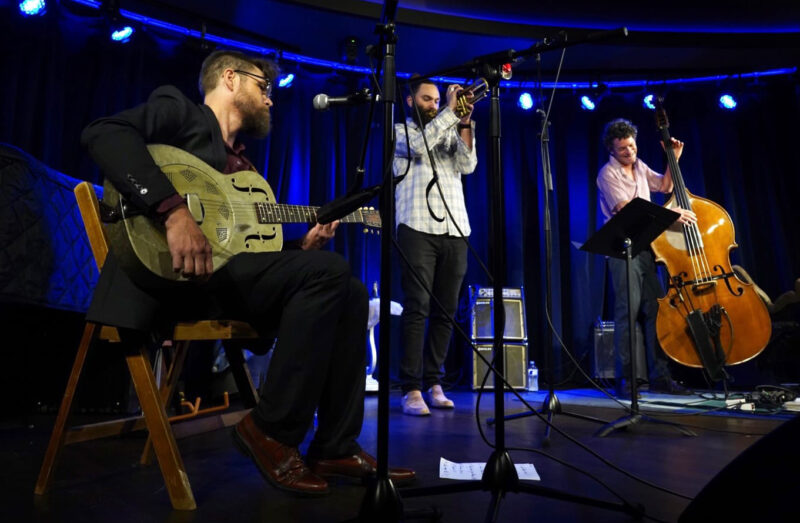
Currently, he fronts the Rollie Tussing Trio, with Serge van der Voo – upright bass and Ross Huff – trumpet and flugelhorn. He also gigs often with Jason Dennie – mandolin, Chris Tabaczynski – reeds, Michael Grant – tuba, and Mike Karub – cello.
Guitarists will salivate over his arsenal of acoustic guitars. He plays a 1920s Sovereign (Oscar Schmidt); a 1935 Washburn 5240; a 1946 Gibson LG2; a 1954 Gibson SJ; and three National resonators: 1930 Triolian; 1936 Duolian and a 1993 Style “O.”
He has issued two CDs: 1998 Blow Whistle Blow – One Man Clapping Records and 2016 Rollie Tussing and the Midwest Territory Band – Self Released.
thecountryblues caught up with the bard and let him tell his own story:
RT: “I started guitar when I was 14, and by the time I was 18, VHS tapes had come out on the market and one of the local grocery stores here had a selection of tapes.
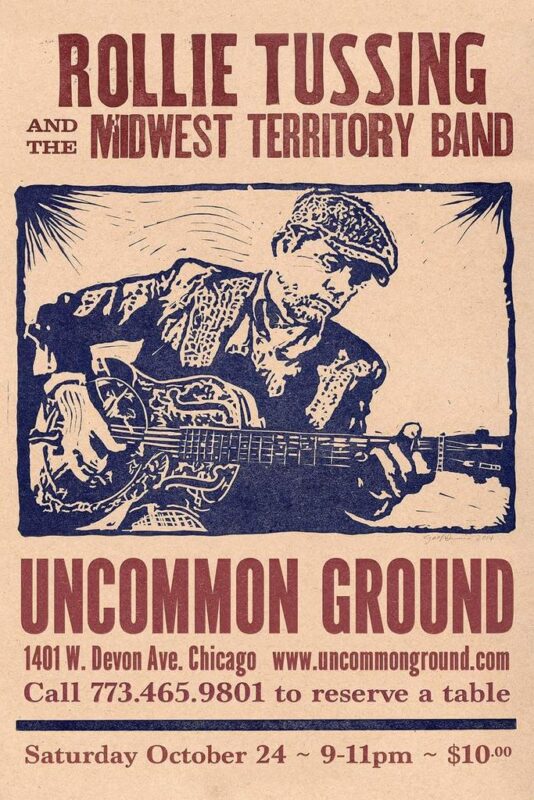
There was a movie called “The Blues According to Lightnin’ Hopkins” by Les Blank. Lightnin’ Hopkins just sounded like the most exotic name for a person I’ve ever heard of. The cover was cool, and I grabbed it. It was music I had never heard before. I was never exposed to fingerpicking guitar in general, let alone a country blues or Texas blues, any kind of acoustic blues – and it it just took me over. I ended up selling all my electric guitars and I wanted to play finger style guitar that I heard Lightnin’ Hopkins play and of course then went on to Mississippi John Hurt and a lot of others. I just couldn’t believe when the first time I heard some of these people that there was only one guitar player. To me that was so much better than the single note stuff that I had been listening to as far as as rock’n’roll and and whatever else I was brought up with.
I approach the guitar as a tool to convey emotion or whatever I wish to convey. Lately I try not to be very percussive when I play. I want to play as few notes as possible to get a point across. I still much prefer the acoustic guitar over the electric, although I play both. I was influenced by a lot of guys that I heard early on, like Lonnie Johnson and Mississippi John Hurt, Eddie Lang and Charley Patton. I’ll put on a Charley Patton record and it’s like I’ve listened to this stuff for decades now and it’s like I’ve never heard it before. There’s still so much for me to find in those old recordings, that I constantly revisit them. There are quite a few contemporary people that I listen to for inspiration. Three of them at the top of my head are Italian folks. This guy Max De Bernardi has a YouTube channel. He’s just wonderful. Of course, there are Django Reinhardt and Oscar Aleman. In my small Midwestern town, I discovered Oscar Aleman. Nobody else knew about him in the ‘90s except for me. He was mine. Of course that’s ridiculous. Early on there was a lot of guys who devoted their life to playing like two different people: Blind Blake or Django Reinhardt. When I heard these guys, they were so good I thought “I’m not going to go there.” I didn’t even listen to Django Reinhardt till I was in my 30s. The same with Blind Blake. I just devoured Oscar Aleman records. There were a couple of bootlegs that I was able to get a hold of old LP’s that were copied from 78s and distributed on these little pink labels. Aleman is one of my favorites. I also really like Eddie Lang. I collected 78s, and a lot of the guitar players were just part of a band sound, like in Clarence Williams’ band. There would be a whole ensemble. They would have their part in the overall sound, and that’s what I listen to now. They rarely go away from playing rhythm, and when they do they have their solo and then they’re out. There’s not a lot of solo flash. That’s what I really love.
Before COVID I was getting more into jazz and branching out into these ‘20s and ‘30s pop tunes that had a lot of different chords and out of my comfort zone. There’s a big group of traditional jazz cats in Detroit and I just went online and put myself out there: Who’s willing to play a play a show or two with me? I got quite a response, and I got to play with some really really good players out of the Detroit, Southeast Michigan area. They really expanded my world and pushed me to be a better musician and one of them was bassist Russ Hoff, and he’s local here to Ann Arbor, so we started playing together.
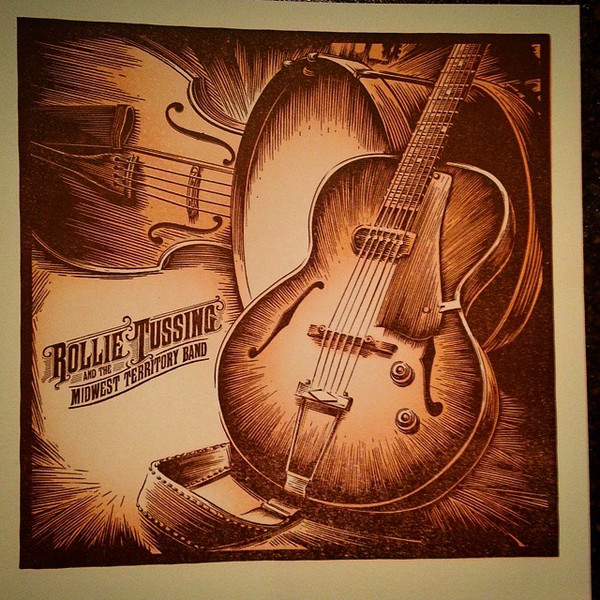
Since COVID I am not touring. I’ve done some small regional tours, but my days of sleeping in the car traveling across country, that was a while ago – I’m not going to say they’re over, because I still want to do it, but they’re not happening now. I did that for 10 to 12 years. When I had a newborn at home, I figured it was time to become a local musician and start some sort of job.
I played in Trnava, Slovakia at the Dobro fest one year. I feel honored to have been able to do that. Yeah, I think that’s probably the big one there. In Brevard, North Carolina, they had the National slide guitar competition. I won that competition in 2001, I believe. I think there was probably 10 musicians from around the country, and I was able to win. That was a good time definitely.
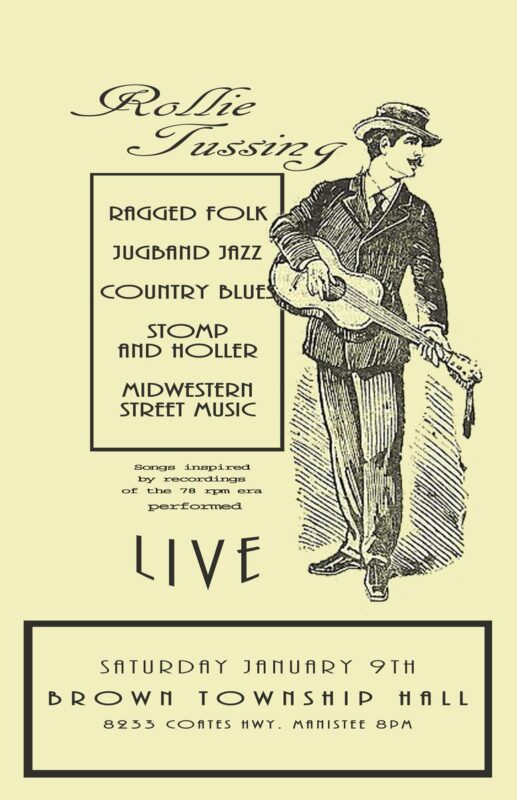
I love authentic art and hope to convey some authenticity with my art. One of the highlights of my musical career was when I was in my 20s, there were a couple of bars in Detroit – the Attic bar was one, which no longer exists. Howard “Louie Bluie” Armstrong was playing there, and I got to see him. I did not get to play with him, but I did play with some Detroit legends: Uncle Jesse White and the Butler twins, to name just a few, sometimes in association with the Detroit Blues Society. Looking back, that was a rare and wonderful experience. I traveled by bus down to Memphis and Mississippi and met James Son Thomas and Eugene Powell. I had no idea who these guys were. There was a record store, Rooster Blues, I think it was called. They said, “Well, here’s an address of an older guy and he plays in the style of Charley Patton – go see him.
I have not had a recording in probably 7-8 years, and my style has changed drastically. I want to make at least one recording with the groups that I’m working with right now — maybe also a solo guitar recording. I want to expand my art in general. I’m a visual artist too, so I have songbooks and maybe a vanity. I do a lot of pen-and-ink drawing and photography.
I’ve been around a lot of singer songwriters my whole life and I’ve always admired that, but I’m happier strumming a guitar and and singing poetry. Songs come to me by surprise. It might be a little lick I’ve played on the guitar for years, or, I sit down and something happens on the guitar. It always happens musically. Then, if I introduce it to other musicians, it becomes more fleshed out and suddenly there’s a song. The main seed takes me 30 seconds, and then it’s just like constantly revisiting for however long, and then it just happens naturally.
I plan on having something out in 2025, whether it be home recorded or studio recorded.”
Keep your ear on this guy for some real listening pleasure.
Rollie Tussing sings Tear It Down at the Ragtime Extravaganza
Rollie Tussing Trio Live at the Ark December 1, 2022
Improvisation on This World is not my Home – Rollie Tussing
